Check out Resources on Nutrient Pollution and Best Practices. Click any link to view full resource.
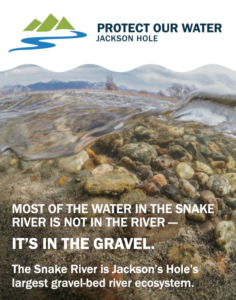
Invisible Rivers Booklet
The Snake River doesn’t just flow down the visible river channel. It flows underground through the cobble, gravel, and sand across the entire valley floor and supports extraordinary biodiversity of life – from Bugs to Bears. This visual guide explains how clean water in the gravel-bed river underground floodplain is fundamental to the health of the entire ecosystem.
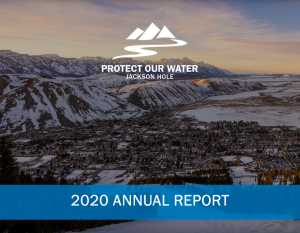
Protect Our Water Jackson Hole - 2020 Annual Report
Despite the challenges presented by the COVID-19 pandemic, Protect Our Water JH made important progress toward both short and long-term goals in regard to Teton County, WY water quality through both public campaigns and local government collaboration. Read about it in our 2020 Annual Report.
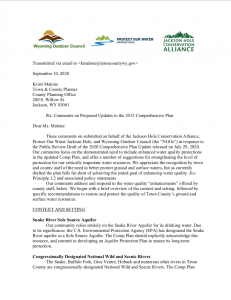
Comments on Proposed Updates to the 2012 Comprehensive Plan
September 10, 2020
Comments submitted on behalf of Wyoming Outdoor Council, Protect Our Water Jackson Hole, and the Jackson Hole Conservation Alliance in response to the Public Review Draft of the 2020 Comprehensive Plan Update released on July 29, 2020. Our comments focus on the demonstrated need to include enhanced water quality protections in the updated Comp Plan, and offer a number of suggestions for strengthening the level of protection for our critically important water resources.
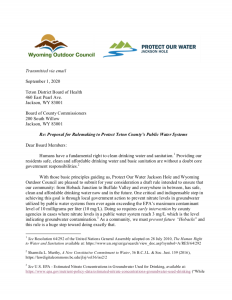
Proposal for Rulemaking to Protect Teton County’s Public Water Systems
September 1, 2020
Proposal submitted on behalf of Protect Our Water Jackson Hole and Wyoming Outdoor Council recommending a draft rule for consideration that would require all public water systems located in Teton County to register with the health department. Also, in the event that nitrate levels in public water systems reach 3 mg/L or higher, a number of actions would be triggered, including reporting and public notice. The proposed rule also specifies that if nitrate levels exceed 3 mg/L in two consecutive months, or three times in any calendar year, an investigation of the public water system, wellhead(s), and surrounding area must be conducted. The final provision requires all public water systems in Teton County to have a Wyoming DEQ-approved source water assessment and source water protection plan on file with the health department, and to make those plans available to the public upon request.
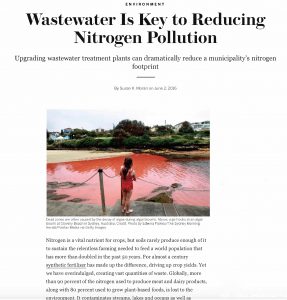
Wastewater Is Key to Reducing Nitrogen Pollution
Scientific American – June 2, 2016
Upgrading wastewater treatment plants can dramatically reduce a municipality’s nitrogen footprint. Upgrading wastewater treatment facilities as well as household septic systems can be expensive, but such measures can dramatically return bodies of water to health.
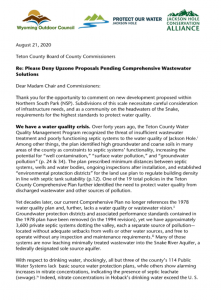
Request to deny upzone proposals in Northern South Park pending comprehensive wastewater management planning
August 21, 2020
Comments submitted on behalf of the Jackson Hole Conservation Alliance, Wyoming Outdoor Council, and Protect Our Water Jackson Hole requesting a county-wide wastewater management plan to precede –and inform– any large and unplanned changes to the county’s development.
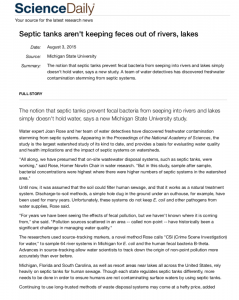
Septic tanks aren't keeping feces out of rivers, lakes
ScienceDaily – Michigan State University, August 3, 2015
The notion that septic tanks prevent fecal bacteria from seeping into rivers and lakes simply doesn’t hold water, says a 2015 study. A team of water detectives has discovered freshwater contamination stemming from septic systems.

Approved Waste Management Planning Cost Share Proposal
Revised proposal that lays out the funding request details in partnership with Teton Conservation District that was submitted to the Teton County Commissioners and approved on June 30, 2020.
Revised proposal that lays out the funding request details in partnership with Teton Conservation District that was submitted to the Teton County Commissioners and approved on June 30, 2020.
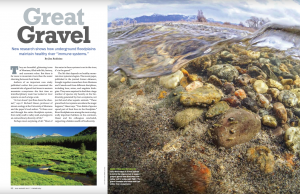
Great Gravel
Montana Outdoors, July-August 2017
New research shows how underground floodplains maintain healthy river “immune systems”.
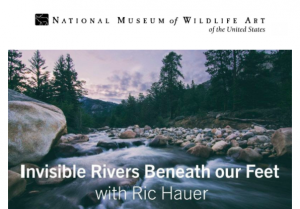
Invisible Rivers Beneath our Feet with Dr. Ric Hauer
National Museum of Wildlife Art and Yellowstone to Yukon Conservation Initiative
Dr. Ric Hauer’s presentation of “Invisible Rivers Beneath our Feet” about gravel-bed ecosystems with a special introduction by Dr. Harvey Locke.